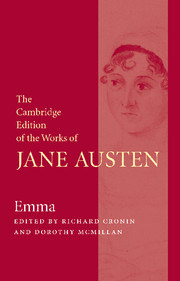Introduction
Published online by Cambridge University Press: 18 December 2020
Summary
COMPOSITION AND PUBLICATION
Jane Austen arranged for the publication of Mansfield Park by Thomas Egerton while she was staying with her brother Henry in London in November 1813. Henry accompanied her on her return to Chawton, where she celebrated a cold Christmas – a great frost began on 27 December, and in February a frost fair was held on the frozen Thames. Emma was begun, according to Cassandra, on 21 January 1814. It was to be an exactly contemporaneous novel, begun just four weeks after the Christmas Eve on which Mr Elton was to make his embarrassing offer of marriage to the novel's heroine.The novel was finally delivered to the publisher John Murray in August or September 1815. The twenty months during which Austen worked on Emma were crammed with momentous events. On 5 April 1814,Napoleon abdicated and was exiled to Elba. That summer the Emperor of Russia and the King of Prussia were in London as guests of the Prince Regent, the man to whom the novel on which Austen was working would reluctantly be dedicated. Her brother Henry astonished her by securing a ticket to the extravagant White's Club ball given in honour of the three monarchs, ‘Henry at Whites! – Oh! what a Henry.’ But the London celebrations were remote from her fictional concerns, which were more engaged by the capacity of Harriet Smith to fall in love with Robert Martin just five weeks after she had been in love with Mr Knightley; ‘Such a heart—such a Harriet!’ (p. 519). By the time that the novel was complete Napoleon had made his dramatic escape and had once again been defeated, but these national events, crucial to Persuasion, scarcely seem touched on in Emma. Happenings nearer home must have been more absorbing. On 6 September 1814, her brother Charles's wife, Fanny, died, a week after giving birth on board her husband's ship to her fourth daughter, Elizabeth, and the baby herself died a fortnight later. There is perhaps a special feeling in the sentence with which one of the novel's closing chapters begins: ‘Mrs. Weston's friends were all made happy by her safety; and if the satisfaction of her well-doing could be increased to Emma, it was by knowing her to be the mother of a little girl’ (p. 503).
- Type
- Chapter
- Information
- Emma , pp. xxi - lxxivPublisher: Cambridge University PressPrint publication year: 2005

